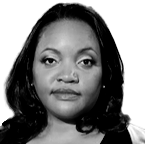Bantam Check-In with Charity Elder ’00
For Charity Elder, Trinity was always just down the road from where she grew up in Hartford.

When it came time to choose a college, she never expected she would remain so close to home. After being accepted into 13 other colleges, “I said there is no way I’m staying in Hartford!” But then, “The letter from Trinity came and I was at my grandmother’s house. There was a line of sight into the living room where everyone was, and I could hear them saying “She got a full ride!”” Elder laughed while recounting, “Everyone was like, you’re going to Trinity! Although it wasn’t my first choice, I didn’t realize how much an academic scholarship––that covered tuition and board––would impact my life until I got older. It’s such a blessing to graduate from college debt free.”
Elder became deeply involved in the Trinity community, relishing the seminar-based classes and group discussions. She traveled to Rome to study abroad, served as an RA, and was the third woman to be president of Imani, the Black Student Union. Once she graduated, she earned a graduate degree at New York University in Broadcast Journalism. But she never left her Trinity studies far behind, even as she progressed in her career. Elder wove the knowledge she had from her sociology degree into her work as a network news producer at NBC and CBS News. “I’ve always had a real interest in reporting on stories that directly impact people,” she explained. For example, as the head of video and podcast at Yahoo News during the 50th anniversary of Martin Luther King, Jr.’s Poor People’s Campaign, she asked her team to come up with features focusing on poverty. Their storytelling brought to light issues Elder understood because of her background in sociology.
Later, she would apply her journalism perspective to work on the Michael Bloomberg campaign for U.S. president. “It was so interesting to have that opportunity,” Elder reflects. As a journalist working on the campaign as a senior advisor for African American outreach, she found herself exploring the other side of politics, removing her journalistic neutrality and instead advocating for a specific candidate. “I’ve covered every election since 2004,” Elder said, “and we try to be impartial and even-handed and true to the facts to the extent that we can be. Journalists are people too, we may make mistakes at times, but every newsroom I’ve ever worked in is made up of good people who try really hard to deliver relevant, fact based news to the public.” “You can’t have a democracy or democratic republic without journalism. I always saw journalism as a public service and politics is another side of that coin.”
When the campaign concluded, it gave her an opportunity to redirect her focus to another of her passions. “After the Bloomberg campaign ended, I got started on a book idea I’d had in mind for a while—about the rise of black women in America.” As a result, Elder has embarked on a new learning experience, one in which she finds a striking parallel to her work at Trinity. Elder wrote a thesis for her undergraduate degree, and has found that experience essential to the book-writing process She even reached out to her thesis advisor, Professor Steven Velocchi. “I emailed him and said I was writing a book and I would love for you to read it.” The two have reconnected, discussing and reviewing sections of the book. Elder is delighted by the chance to exchange ideas with her former advisor, “Talk about coming full circle!” she remarked.
As she continues to work on the manuscript, Elder is learning more and more about her subject matter, including making some Hartford connections. The abolitionist Maria W. Stewart, for example, was born in Hartford, and in the early 1830s became the first woman of any race to lecture publicly to a mixed audience of men and women. Elder is finding ongoing inspiration as she reads about women who broke barriers, endured tremendous hardship, and accomplished monumental achievements despite challenging circumstances.
Elder’s connection to the women who came before her has helped her become a formidable digital media executive and a driven lifelong learner. When asked about what advice she would offer to the women who will follow her, she noted, “I absolutely believe women, and black women in particular, should be going for those leadership roles, and should not step back from that. How you communicate, how you assume authority and how you wield power are essential skill sets.” Elder remembers having her younger sister help her post signs on campus when she ran for president of Trinity’s student government. She noted that when you reach for the stars, it won’t always work out, “I lost, and badly. But, you have to go for it,” she said. Risk is part of the process, she insists, and notes a famous line from President Theodore Roosevelt’s “Citizenship in a Republic” speech. Even if you fail, it reads, you do so “daring greatly.”
For young professionals, she offered this: “Never let anyone take your voice. You have the right to speak.” She urged Bantams to use what resources they have on hand, and when they’re ready, to offer their own time and expertise to help their fellow Trinity graduates and current students. “Put your information in the Bantam Career Network!” she said. “We have some responsibility to help those coming behind us. Find a way to do something small.” Elder herself has been a mentor to a current student and looks forward to more opportunities to offer her time to the Trinity community. In the meantime, she’ll be focusing on her book—and will continue to inspire the next generation of Bantams to make their voices heard.
Interested in learning more about the Bantam Career Network? Sign up today!
Charity Elder '00“We have some responsibility to help those coming behind us. Find a way to do something small.”
